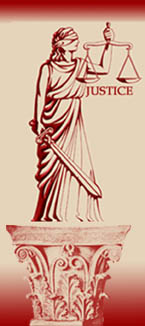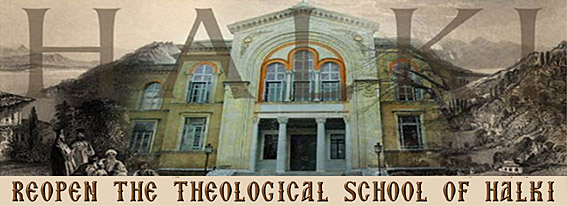|
|
|
|
CONSTANTINOPOLITAN SOCIETY ESTABLISHED 1928 2002, O.S.C.E. MEETING, WARSAW
|
|
|
CONSTANTINOPOLITAN
SOCIETY
ESTABLISHED
1928 2002
OSCE MEETING, WARSAW
www.greece.org/themis/halki/osce.html Ladies
and Gentlemen, Since
the creation, in 1923, of the Turkish Republic, Turkey has always
declared its intention to become part of the Western world. Turkey
declares that she considers all her citizens equal, regardless of their
ethnic origin or creed. It
is just because of our great desire to see the Turkish Republic change
into a modern European country, that we can’t but express our
bitterness and our grief for the events of the past:
The pogrom against ethnic Greeks in 1955, the selective taxation
of non-muslims in 1942, the exclusive military mobilization and
confinement in forced labour camps of Christians aged between 20-40
years in 1941, the outrageous secret decree of 1964, whereby Greek
minority members of non-Turkish citizenship were deprived of even the
right to inherit their families’ property, after having been massively
expelled from the country. What
is left today of the once 270,000-strong and prosperous Greek minority
in Istanbul, former Constantinople, is just 2000 elderly people. The
Orthodox Ecumenical Patriarchate is another survivor, whose spiritual
and cultural importance to the World vastly exceeds that of the remnants
of the Greek minority. Today’s Turkey should be judged, in matters of
religious freedom, according to its conduct towards holy institutions
like this one. The
« Ecumenical Patriarchate of Constantinople or New Rome »
is one of the two most
prominent institutions of Christendom, the other one being the Holy See
in Rome. Having served for almost two millenia as the spiritual beacon
for all Orthodox Christians, its seniority is acknowledged and respected
by all other Orthodox Patriarchates and Autocephalus (autonomous)
Churches. The Ecumenical Patriarch’s rank in the Orthodox Church as
« primus inter pares » among all Orthodox Patriarchs
is the equivalent of that of the Pope as « primus solus »
in the Catholic Church . Indeed,
the leaders of other Christian denominations and even the ones of other
creeds, as well as international organisations, including the European
Union, acknowledge the international spiritual importance of the
Ecumenical Patriarchate and recognize the Patriarch as an official
interlocutor of theirs. Modern
Turkey however, the host
country to the Patriarchate, has always treated it with mistrust
and sometimes with open
hostility. Turkey does not
recognize the Patriarchate’s ecumenical character and claims it exists
only to serve the religious needs of the -hardly surviving-
remnants of the Greek minority of Constantinople, thus degrading
the Patriarchate to the level of a simple parish. His All Holliness the
Ecumenical Patriarch is dealt with by the Turkish state at the level of
the Deputy Prefect of Istanbul, a middle-rank bureaucrat of the Ministry
of the Interior. Besides,
a 1923 Decree
(teshkere),
which provides that only
prelates living in Turkey and are of Turkish nationality are
eligible for the dignity of Ecumenical
Patriarch, unfairly limits
the pool from which candidates can be drawn, since Turkey’s Greek
Orthodox minority has been reduced to 2000 elderly people, as I
stated before. What
is more, Turkish authorities and courts have been denying the
Patriarchate its legal personality, depriving it, thus, from the right
to own property. Even the Patriarchate’s building in Fener is
registered in the local land registry as the property of St Dimitrius!
The Ecumenical Patriarchate receives
no subsidies from the State ; on the contrary, the administration
of a number of its assets has arbitrarily been taken over by the
Government. The
fact that the Turkish state does not recognize the Ecumenical
Patriarchate’s legal personality also causes many difficulties to the
Patriarch’s freedom to travel abroad or to receive
official visitors such as the Presidents of Germany and Poland.
Another issue of major importance is that of the Theological
Seminary of Heybeliada ( Halki), a higher education Divinity School
which was closed by the Turkish Government in 1971. It
should be noted that the Holy Theological Seminary of Halki
was the single most
important institution to prepare highly educated clerics
intended for appointment to the Ecumenical Patriarchate. Even
foreigners used to come from abroad
to follow the courses of the Seminary and get the appropriate
education. 12 Ecumenical Patriarchs, 2 Patriarchs of Antiocheia, 5
Archbishops and 920 other high-ranking clerics have graduated from the
Seminary. Therefore,
since the Seminary’s closure, the Patriarchate has been deprived of
the means to train new clergy, among whom the next Orthodox Ecumenical
Patriarch will have
to be selected.
The reopening of the Seminary of Halki is
essential not only for the
Ecumenical Patriarchate, but also for
the Orthodox
Christian world in general
and, naturally, for Turkey itself, in its supposed course towards
joining the European
family. Looking
at the justifications being given by the Turkish Republic for not
reopening the School, we will explain why these justifications are
unfounded. They
accuse us of attempting to discredit Turkey by seeking the re-opening of
the Theological School of Halki. This is untrue. We ardently stand up
for a democratic Turkey within the bosom of the West, a Turkey that
would respect its obligations stemming from the international legal
instruments it is a party to. If we sound unpleasant by telling the
truth, it is not our fault. Turkey
maintains that she has not acknowledged any special rights to any of its
minorities. The 1923 Treaty of Lausanne however, cornerstone of the
creation of the modern Turkish state, in its articles 37-44 entitled
“Protection of the Minorities”, clearly provides for full freedom of
minority religious and other institutions. The
Turkish side also maintains that the Turkish Constitution and various
Turkish Laws prohibit the function of the Theological School of Halki,
but ignores, that the School functioned continuously for 127 years,
according to Ottoman Laws and the Constitutions and Laws of the Turkish
State. It should be
stressed that no state can invoke its internal legislation in order to
evade its international obligations. They
maintain that the Turkish Republic is a secular country and conveniently
“forget” that a secular country is one that provides religious
freedom. They intentionally ignore the way secular countries function,
for example France, where all major religions are free to establish
educational institutions. They
maintain that the Ecumenical Patriarchate refuses to operate the School
under the supervision of the Turkish state. However, the Turkish
Republic is in full knowledge that the Ecumenical Patriarchate has never
rejected the re-opening of the Theological School of Halki under the
same conditions within which it had functioned for 127 years. When the
School was open, the “Regulations of the School’s Function” were
always approved in regular intervals by the appropriate Turkish
authorities. Ladies
and Gentlemen, An
international campaign has begun as of this January. This campaign is
addressed to the President of the Turkish Republic and to 5.000
personalities of international political and religious life and
constitutes an appeal for the reopening of the Holy Seminary of Halki. We
kindly request all those who have the same appreciation for human and
religious rights to add their voice to the campaign of THEMIS, a project
of a US non-governmental organization named HEC www.greece.org
. This campaign is supported by 64 international associations and has
collected thousands of signatures from 65 different countries the world
over for the reopening of the Theological School of Halki. You, also,
may do so, at the electronic address www.greece.org/themis/halki. We
ask from the Turkish Republic to honor its obligations towards its own
citizens and the international community, by allowing the reopening of
the Theological School of Halki. Finally,
we ask from all of you to add your voice to the just request for the
reopening of the Theological School of Halki, under the same conditions
within which it had functioned for 127 years. Thank you for your attention. |
|
|
|


